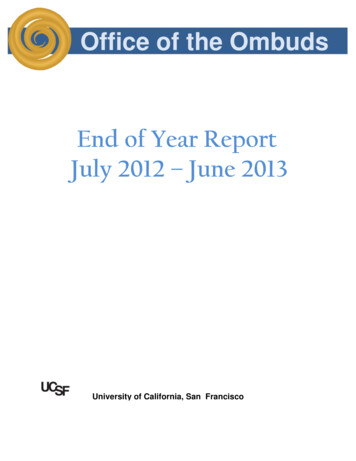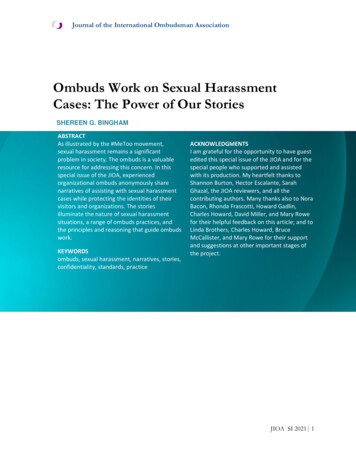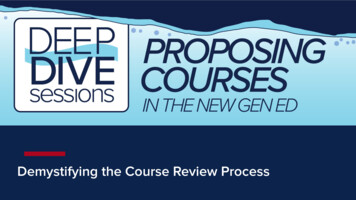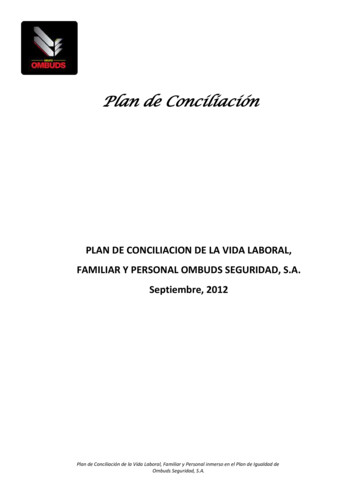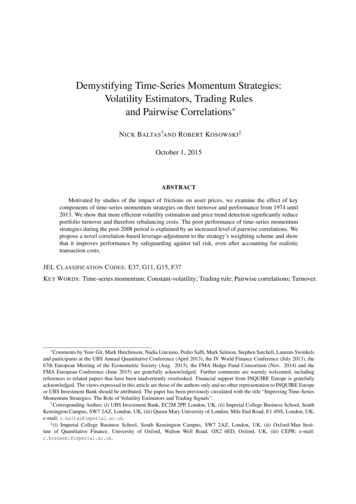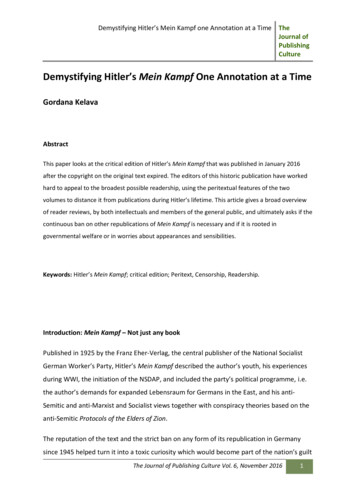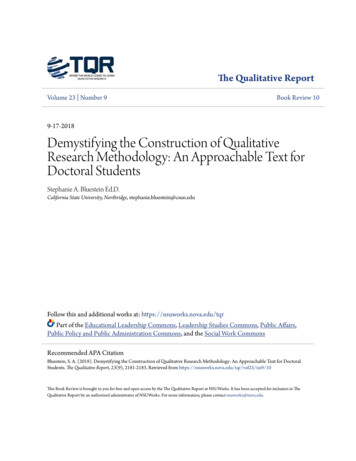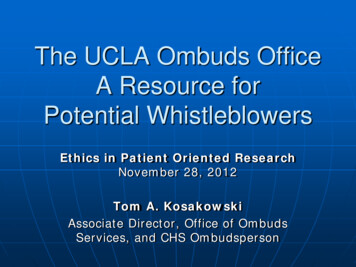
Transcription
The UCLA Ombuds OfficeA Resource forPotential WhistleblowersEthics in Patient Oriented ResearchNovember 28, 2012Tom A. KosakowskiAssociate Director, Office of OmbudsServices, and CHS Ombudsperson
You’ve Suspect Misconduct,Now What? Most people consider whether tobecome a whistleblower.A whistleblower is a person who tellsthe public or someone in authorityabout alleged dishonest or illegalactivities (a violation of a law, rule orpolicy such as fraud, health/safetyviolations, and corruption).
Being a WhistleblowerHas Drawbacks A recent study of 26 pharmaceuticalcompany whistleblowers found thatmost were not happy with the process.(Aaron S. Kesselheim, et al., N. Engl. J. Med. 2010,362:1832-1839.)For most of the whistleblowers in thestudy, the triggering event for theirreport was a career change (startingwith a new company or getting apromotion).
Drawbacks (cont.) The whistleblowers were motivatedto report misconduct out of integrity,altruism or public safety, justice, andself-preservation.Once they made their report, 82% ofthe whistleblowers reported beingsubjected to various pressures bythe company in response to theircomplaints.
Drawbacks (cont.) Many of the whistleblowers reportedother related problems, including: “Devastating” financial consequences(31%); Divorce or had severe marital problems(26%); and Stress-related health problems (50%).
Drawbacks (cont.) In this study, the whistleblowerswere entitled to share in themonetary recovery, but theyperceived the financial gain to besmall in comparison to the vastamount of time they spent on thecase, and the damage and disruptionto their professional careers.
So What Can You Do? In light of the fact thatwhistleblowing could have seriousramifications for your career (as wellas those you implicate) expertsadvise caution.
So What Can You Do? (cont.) Generally, there are three optionsavailable to the whistleblower: Ignore the misconduct; Handle it on your own; or Report the behavior. And there are a myriad ofconsiderations (when, who, how).So, how can you decide what to do?
Before Reporting Evaluate your situation using anethical decision-making model.Office of Research Integrity, “The Lab: Avoiding ResearchMisconduct“ (interactive video, guide, p. 26), 2011.
Ethical Decision-Making Model I feel - you feel something about the situation in your bodyDecide if this situation raises a moral issue by asking: Am I violating my moral emotions if I do nothing? Am I putting anyone at risk if I do nothing? Is something bad likely to happen here?Check whether moral intensity factors are affecting you byasking: Would my peers in research see a moral issue here? How close do I feel to the people involved in thissituation?
Ethical Decision-Making Model (cont.) I ask – weigh different choices to distinguish right fromwrong, better from worse, and between competing tensions If I take action, is that fair or unfair? Morally right or morallywrong? What would someone I respect think is the best option? If I take action, is that decision in line with my lab’s rules andculture? What about my university’s rules and culture?Ask whether moral intensity factors are affecting yourjudgment: What would my peers in research think about my actions? How much harm could come to someone if I take action? What if Idon’t take action? How much harm could come to the lab? Whatabout to the university? How likely is it that this situation will turn out badly if I don’t takeaction?
Ethical Decision-Making Model (cont.) I think I will – decide what to do or not to do What do I think I should do? How much will what other people think about meinfluence my decision? Do I intend to act on that decision?I act – carry out your intention, even if there is greatopposition Do I follow through on this intention? What may prevent me from acting on my intention?
But, Who Can You Trust? Most knowledgeable resources wouldbe required to report your concerns.
Consider Consulting the Ombuds The first ombudsman was appointed by theking of Sweden in 1809 to voice citizen’sconcerns.The first university ombuds office wasestablished at Michigan State University in1967. UCLA was an early adopter andfollowed in 1969.There are two primary kinds of ombuds:advocate (or classical) ombuds andorganizational ombuds. Universitiesgenerally employ organizational variety;there are almost 300 at present.
Definition of anOrganizational Ombuds “An organizational ombudsperson isa confidential and informalinformation resource,communications channel, complainthandler and dispute-resolver, and aperson who helps an organizationwork for change.”Mary P. Rowe, “Options, Functions and Skills; What anorganizational ombudsperson might want to know,” 1995.
A Few Other Universities Withan Ombuds ProgramAlbany State UniversityAlgonquin CollegeAmerican University of KuwaitAmherst CollegeArizona State UniversityAshford UniversityAthabasca UniversityAuburn UniversityBall State UniversityBaylor UniversityBinghampton UniversityBishop's UniversityBoise State UniversityBowling Green State UniversityBrock UniversityBrown UniversityCalifornia Institute ofTechnologyCalifornia State BakersfieldCalifornia State HumboldtCalifornia State Long BeachCalifornia State Monterey BayCalifornia Poly PomonaCalifornia State San BernardinoCalifornia State San DiegoCalifornia State San JoseCalifornia Poly San Luis ObispoCamosun CollegeCarleton UniversityCentral Connecticut StateCentral Michigan UniversityCentral Washington UniversityChicago State UniversityThe CitadelFlorida Gulf Coast UniversityFlorida International UniversityFlorida State University SystemGallaudet UniversityGeorge Mason UniversityGeorgetown UniversityGeorgia Institute of TechnologyGeorgia State UniversityGuilford CollegeHamline UniversityHampshire CollegeHarvard UniversityIdaho State UniversityIllinois Institute of TechnologyIllinois State UniversityIndiana State UniversityIndiana UniversityInstitute of TranspersonalPsychologyIowa State UniversityJames Madison UniversityJefferson Medical CollegeKansas State UniversityKeio UniversityKennesaw State UniversityKent State UniversityKenyon CollegeLakehead UniversityLehigh UniversityLeiden UniversityLewis & Clark CollegeLouisiana State UniversityLoyola Marymount UniversityMarquette UniversityRutgers UniversityRyerson UniversitySaginaw Valley StateUniversitySaint Louis UniversitySanta Monica CollegeSavannah College of Art &DesignSchoolcraft CollegeSeneca College Simon FraserUniversitySmith CollegeSouth Texas CollegeSouthern Illinois UniversityStanford UniversitySUNY AlbanySUNY PurchaseSUNY Stony BrookSullivan UniversityTechnische UniversitätDarmstadtTechnische Universiteit DelftTennessee State UniversityTexas A&MTexas State UniversityTexas Southern UniversityTexas Tech UniversityTexas Woman's UniversityUnion CollegeUniversitat Autònoma deBarcelonaUniversiteit GhentUniversity of AlabamaUniversity of AlbertaUniversity of MassachusettsLowellUniversity of Medicine &Dentistry of New JerseyUniversity of MemphisUniversity of MiamiUniversity of MichiganUniversity of MinnesotaUniversity of MissouriUniversity of NebraskaUniversity of New BrunswickUniversity of New MexicoUniversity of North Carolina:Chapel HillUniversity of North FloridaUniversity of North TexasUniversity of OklahomaUniversity of OttawaUniversity of Paris 1 PantheonSorbonneUniversity of PennsylvaniaUniversity of Puerto RicoUniversity of Rennes 1University of San FranciscoUniversity of South CarolinaUniversity of South FloridaUniversity of Southern MaineUniversity of TennesseeUniversity of TexasUniversity of ToledoUniversity of TorontoUniversity of TorontoUniversity of VictoriaUniversity of Virginia
Mission Statement The Office of Ombuds Services is a placewhere members of the UCLA community–students, faculty, staff andadministrators–can go for assistance inresolving conflicts, disputes or complaintson an informal basis. In order to affordvisitors the greatest freedom in using itsservices, the Office is independent, neutraland confidential.
Range of Ombuds’ Services itatingMediating
Outside the Ombuds’ Scope Receiving formal complaintsAssigning blame or culpabilityDeciding outcome of disputeEnforcing agreementsProviding legal or psychologicaladvice
Ombuds Ethical ence International Ombudsman Association,Code of Ethics and Standards of Practice
Confidentiality The Ombuds Office Doesn’t keep records; and Doesn’t reveal visitor information. The Ombuds Office is not amandated sexual harassmentreporter.
Confidentiality &Sexual Harassment “Each location shall identify confidential resources with whommembers of the University community can consult for adviceand information regarding making a report of sexualharassment. These resources provide individuals who may beinterested in bringing a report of sexual harassment with asafe place to discuss their concerns and learn about theprocedures and potential outcomes involved. These resourcesshall be posted on the location’s website and prominentlydisplayed in common areas. Confidential resources includecampus ombudspersons and/or licensed counselors inemployee assistance programs or student health services.Individuals who consult with confidential resources shall beadvised that their discussions in these settings are notconsidered reports of sexual harassment and that withoutadditional action by the individual, the discussions will notresult in any action by the University to resolve theirconcerns.”University of California Procedures for Responding toReports of Sexual Harassment, Dec. 14, 2004
Confidentiality & Whistleblowing At UC Santa Barbara, thewhistleblower policy specificallystates that the Ombuds Office isconfidential and not subject to thereporting requirements.UCSB Implementing Procedures for theWhistleblower Policy, § II.F., 2008.
Independence The Ombuds Office reports as a partof the Chancellor’s office.Ombuds and are not students ormembers of faculty.
Neutrality The Ombuds Office does not Take sides in a conflict; or Impose a resolution. However, the Ombuds Office may Advocate for fair process; or Report on systemic concerns or problems.
Informality The Ombuds Office provides informalalternatives to formal remedies.The Ombuds Office can help explainthe formal remedies available, butwill not participate in any formalprocesses.
Role of Ombuds in Cases ofSuspected Research Misconduct Discussing all the details Providing additional information UC Policies, UCLA Procedures, Schooland Departmental practices Institutional insights Additional informal inquiries
Role of Ombuds (cont.) Developing a Plan of Action Identification of optionsEvaluating risks and benefitsProviding emotional supportSuggesting tactics and strategiesIntervening with ConsentOmbuds Facilitating informal conversation Giving upward feedback
Office Locations Main OfficeStrathmore Building501 Westwood Plaza, Suite 105Phone: 310-825-7627CHS Office52-025 Center for Health SciencesPhone: 310-206-2427www.Ombuds.UCLA.edu
Consider Consulting the Ombuds The first ombudsman was appointed by the king of Sweden in 1809 to voice citizen's concerns. The first university ombuds office was established at Michigan State University in 1967. UCLA was an early adopter and


